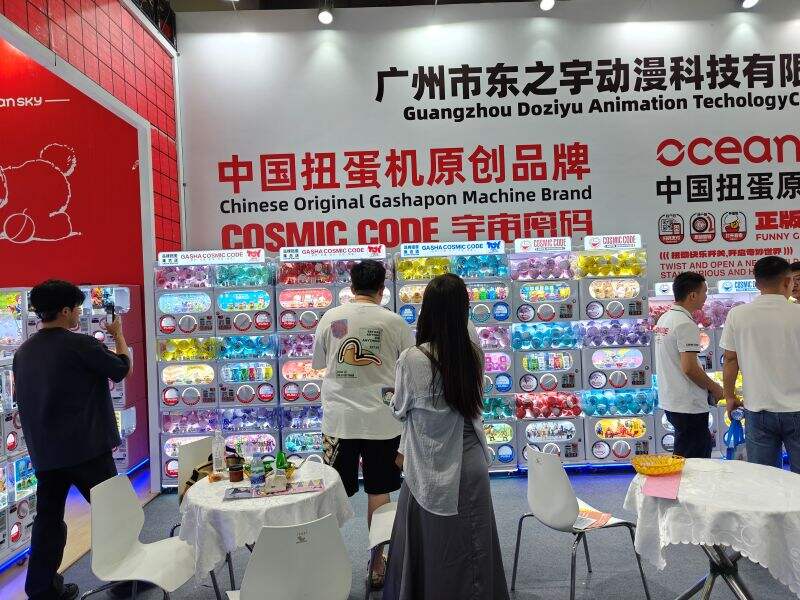Why Durability Matters: The Role of Build Quality in High-Traffic Gashapon Machines
Rising Deployment of Capsule Vending Machines in Shopping Malls
Shopping malls today typically have around 12 to 15 capsule vending machines spread throughout their properties because people want more engaging retail options. The ones located in busy spots such as near the food court or at the main entrances get used about 63 percent more each day compared to machines sitting in regular hallways. Because they're getting so much action, these machines need to be built tough. Mall operators tell us that plastic machines break down roughly twice as fast as metal ones in these hotspots. That's why most businesses are investing in sturdier models for prime locations where foot traffic is highest.
How Construction Quality Impacts Long-Term Return on Investment
Investing in premium steel frames along with those industrial strength coin mechanisms can save operators around $18k on maintenance expenses over five years when compared to cheaper alternatives. Machines built with commercial grade metal reinforcement generally last through about 27 thousand operations each year before showing any signs of wear, whereas budget machines made from thin gauge materials often start developing warped components after just eighteen months of regular use. For business owners who focus on solid construction rather than cutting corners, this translates into roughly 34 percent better profit margins because there's simply less time spent dealing with breakdowns and repairs throughout the day-to-day operation.
Case Study: Breakdown Rates in Urban Transit Hubs vs. Suburban Malls
According to research published by Urban Retail Systems in 2023, vending machines near subway stations needed around 11.7 service calls each year while those in suburbs only got about 4.2 fixes. The constant shaking from train movements plus all that people walking back and forth really takes a toll on things like door locks and touchscreen displays. When vendors at Tokyo Station switched out their regular casings for ones made from military spec aluminum alloys, they saw repair bills drop nearly half - down by 52% specifically. This shows that spending money on better materials can actually pay off big time when dealing with tough environments where equipment gets worn down faster than normal.
Key Materials and Structural Design for Maximum Durability
Advantages of Full Metal Shells Over Plastic in High-Traffic Environments
In high-traffic zones like shopping malls and transit hubs, full-metal enclosures offer 3–5 times greater impact resistance than plastic alternatives. Steel-reinforced bodies prevent casing warping—a common failure in plastic units subjected to repeated coin insertion and door use—ensuring long-term structural integrity under daily wear and accidental collisions.
Data Insight: 68% Fewer Service Calls for Metal-Bodied Units (2023 JAMA Report)
According to the 2023 JAMA Report on Urban Vending Systems, metal-cased gashapon machines required an average of 27 annual maintenance interventions, compared to 85 for plastic models. This durability translates to $12,300 in downtime cost savings per unit over five years, validating the value of higher initial investment in robust materials.
Internal Frameworks and Vandal-Resistant Locking Mechanisms
Heavy-duty internal bracing distributes mechanical stress from aggressive user interaction, while tamper-proof latches with magnetic sensors deter vandalism. Cross-bolted panel joints and 14-gauge steel framing maintain alignment under up to 450 lbs of lateral force—protecting sensitive dispensing mechanisms in high-exposure public installations.
Evaluating Suppliers: Choosing Reliable Manufacturers for Commercial-Grade Gashapon Machines
Assessing Manufacturer Commitment to Structural Integrity
When setting up capsule vending machines in shopping centers, it pays to take a close look at how they're built. Machines from manufacturers that weld their metal parts precisely and use steel frames at least 2mm thick tend to need fewer repairs compared to cheaper alternatives according to a recent industry report from VHQ in 2023. The difference is pretty significant too - around 27% less frequent part replacements. And when factories have proper quality control certifications like ISO 9001, these machines last much longer between breakdowns. Field testing shows something like 800 hours before needing maintenance, which matters a lot for busy locations where people interact with them thousands of times each day.
Balancing Cost-Cutting and Longevity in Mass Production
The initial price tag goes up around 15 to maybe 20 percent when going with those 18 gauge stainless steel doors, but operators in big cities are saving well over $1,200 each year on repairs according to the latest Amusement Economics data from 2024. For places outside the urban centers, many businesses find success using powder coated aluminum panels on the sides rather than going all out with stainless steel everywhere. This approach still stands up against rain and sun damage pretty well, yet cuts down total spending by roughly a third. Makes sense really, since most suburban locations don't need the same level of durability as their city counterparts facing constant crowds and harsh weather conditions.
Certifications and Testing Standards for Durable Amusement Machines
When coin mechanisms meet ASTM F963-17 standards, they can handle over 150 thousand insertion cycles before showing wear. Plus, electronics rated at IP54 level keep most problems at bay, stopping around 9 out of 10 issues caused by moisture in busy places like mall food courts. For manufacturers who actually go through proper stress tests, like those involving 50kg of sideways pressure, the results speak for themselves. Their products end up with under 5% service recalls throughout warranty periods. That's pretty impressive when compared to the industry norm for machines that haven't gone through certification processes, where recall rates tend to be about twice as high.
Designing for Real-World Use: Functionality and User Behavior in Busy Locations
Adapting Gashapon Machines for Crowded, Fast-Paced Urban Spaces
Gashapon machines in dense urban environments benefit from touchless payment integration and reinforced internal housings, which reduce failure rates in locations with over 200 daily users. Angled display panels improve visibility in congested areas, while modular designs enable rapid part replacement during peak operating hours.
High-Wear Zones: Understanding User Interaction Patterns
Field analysis identifies consistent stress points in high-traffic deployments:
- Coin slots and selection buttons endure four times more contact than other components
- Transparent prize windows account for 22% of maintenance requests due to scratching
Using durable acrylics and stainless steel interfaces in these zones reduces downtime by up to 40% compared to standard materials.
Balancing Aesthetic Appeal with Functional Resilience
Good industrial design matters a lot in amusement equipment manufacturing. The brushed metal finish works great because it hides those pesky fingerprints but still looks fancy enough to fit in any modern arcade setting. Those little details count too - manufacturers often build tamper proof seams right into the decorative grooves so nobody can just pry things open. According to recent surveys, nearly seven out of ten customers care about how professional something looks when they're picking their favorite game machines. Cleanability is another big factor though. Designers need to make sure surfaces wipe down easily while keeping all those backup mechanical systems intact behind the scenes. Nobody wants maintenance headaches after all. Most companies run extensive tests on prototypes these days, subjecting them to over ten thousand simulated plays to find any weak spots before sending units out to arcades across the country.
FAQ
Why is build quality important for gashapon machines?
Build quality is crucial for gashapon machines in high-traffic areas to withstand frequent use and minimize the need for repairs, ensuring better return on investment.
How do metal gashapon machines compare to plastic ones?
Metal gashapon machines offer greater durability and require fewer maintenance calls compared to plastic ones, making them more cost-effective in the long run.
What materials are recommended for gashapon machines in urban settings?
For urban areas with high usage, materials like military spec aluminum alloys and reinforced metal frames are recommended to handle stress and minimize breakdowns.
Table of Contents
- Why Durability Matters: The Role of Build Quality in High-Traffic Gashapon Machines
- Key Materials and Structural Design for Maximum Durability
- Evaluating Suppliers: Choosing Reliable Manufacturers for Commercial-Grade Gashapon Machines
- Designing for Real-World Use: Functionality and User Behavior in Busy Locations
- FAQ

 EN
EN
 AR
AR DA
DA NL
NL FI
FI FR
FR DE
DE EL
EL HI
HI IT
IT JA
JA KO
KO NO
NO PL
PL PT
PT RU
RU ES
ES SV
SV TL
TL IW
IW ID
ID VI
VI HU
HU TH
TH TR
TR MS
MS GA
GA LO
LO MY
MY